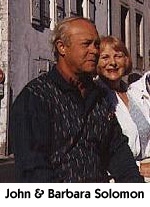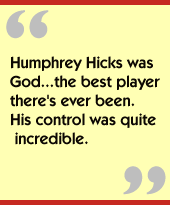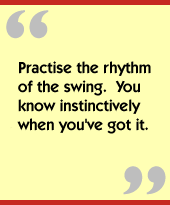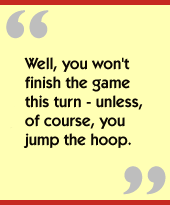

|
Back to |
| The Front Page |
| People |
|
Interviewing John Solomon by Neil Williams Posted April 7, 1999 |
|
||||
The first of a series of conversations with prominent figures in croquet appeared in the March issue of England's CROQUET GAZETTE. We reprint here in its entirety Neil Williams' account of his interview with John Solomon, the obvious choice to lead the series. As Williams observes, "You can be sure that every croquet player has heard of John Solomon, for he stands in relation to croquet as Don Bradman to cricket or Jack Nicklaus to golf: the touchstone of all that is best in the game."

John Solomon's dominance of the court lasted for 25 years, and his achievements have now become the stuff of legend, so much so that we begin to wonder whether it all really happened.
That winning jump shot, in the Champion of Champions Tournament: did Solomon, against the finest opposition in the land, Nigel Aspinall, really hit a shot of 24 ft 3 inches which went over the Rover, landed, ran on and hit the peg dead centre to win the match?
And can anyone really have won an open doubles match in two straight games when his partner was not even present? Common sense says no, but John Solomon did.
It is typical of a man who describes his own temperament as "equable" that when I ask about the second game of that "single doubles," he gives part of the credit for the victory to a spectator, the then President of the Croquet Association, the ineffable Maurice Reckitt. John told me: "I was winning the second game on court 2, and Maurice walked down from court 4. As he passed me he said, 'Let's see how this exhibition game is going.' Well, at that point I had begun to think that maybe I ought to retire on the peg. Now I thought, if I do retire then it IS an exhibition game. So I'm not going to. And, of course, I went on to win. It was the only remark of Maurice's that I didn't like."
Perhaps we should, for the informing of newcomers to the game and the re-inspiring of old hands, briefly set down the facts of Solomon's achievement as a player. I quote from his recent croquet autobiography, which made the basis of our conversation. ["From the Beginning to the End," 1998, available in typescript from the Croquet Association.]
"From 1952 on I was involved in a final in Open Championship week in every year except 1957, when I did not enter, until 1971. Starting with the President's Cup in 1957, I won nine consecutive championships up to and including the Men's in 1960. Starting with the Open Championships in 1963, I won 10 consecutive championships up to and including the Open Singles and Doubles in 1965."
In total, John Solomon has won 48 championships, an unequaled record.
We met to talk at Hurlingham (where else?) in February, 1999. To begin with we talked about what I see as the three separate stages of his career at the top. The first lasted two or three years, he says.
"In the school holidays, from Charterhouse, I used to cycle over from our house in Putney to Roehampton two or three afternoons a week to practise. At the end of that time my game was there. I'd got it."
What he'd got, of course, was the foundation of everything else, the rhythm of his entirely natural swing.
The next stage, after the "schooling" at Roehampton and in early tournaments, was that astonishing Test tour of New Zealand and the subsequent private tour of Australia in the period from late 1950 to May, 1951.
"I had a wonderful time. We were there for 90 days and we played croquet on 85 of them. All the women adored me. I was terribly spoilt. I just loved it. When I got back I began to get quite good."
One of the "we" was, of course, the then master of croquet, Humphrey Hicks, of whom John said: "Oh, he was God. He was the best player there's ever been. His control was quite incredible."
When he and Hicks went on from New Zealand after the Tests to Australia to tour the clubs and play exhibition matches, the young Solomon had the great Hicks to learn from. He was the Merlin to Solomon's Arthur. It says everything about Humphrey Hicks that he was willing to share so much with the young player most likely to topple him from the tree. "What I learned from Hicks above all was control and accuracy. We were always good friends. In fact he was godfather to one of my children."

I express my regret that players now can only imagine the play and players in the 50's and earlier. Not for the last time in this conversation I am pulled up sharp by what John says next: "When I was in Australia for the World Championships last year, the referee came over and gave me a video made from film shot during that 50/51 tour. It includes film of prewar players, too. I myself have an enormous amount of 16 mm film that I shot in later years of Cotter and others. I've turned that into video too. When I can find time I want to put the two together and produce a tape of about two hours which I'd be willing to put on sale for a fiver or so."
All this material is irreplaceable, of course. We must hope that John will be able to complete the project very soon and let us see what must be unique archive film.
Back in England, John now with a handicap of -2.5 (it had been +1 when he had played D.D. Steel - yes, that D.D. Steel - in 1950 before the tour), won his first championship, the Men's. The sequence of victories was launched.
Without wishing to strain the analogy too far, if Roehampton had been John's croquet "school," that tour had been his degree course. Now he was ready for his Doctorate. Again, a single person looms large at this stage: Patrick Cotter, the intellectual, the innovator, and Solomon's Doubles partner for over 20 years.
"I was always more frightened of playing Humphrey than ever I was of Pat Cotter. We knew each other's game terribly well. We had a little rule in Doubles that we would try never to be on the court at the same time. We were fed up with people who would go on and have a five minute consultation when it was perfectly obvious what shot to take."
Clearly, the partnership with Cotter was one of equals - perhaps confirmed by the fact that they never had a cross word, even though Cotter had the reputation of having a short fuse. It was certainly confirmed in the mind of the croquet world, who called the three (Hicks, Cotter & Solomon) "The Triumvirate."
Yet somewhere around this time one of the three - Solomon - became more equal than the others as he moved into his finest years. He says that 1959 was probably the best, but connoisseurs of fine vintages might like to sample 1961; or 64, the year of the 3-ball triple; or 69, the year of That Shot. Now, in the 1990s, he is enjoying an Indian summer at Southwick, playing in the Veterans' and, of course, in the Hurlingham August tournament.
Time is running out for our conversation and I want to turn to the other side of his career, his nearly 50 years as policy maker on the Croquet Association Council, as a promoter of the game, coach and ambassador. Fortunately, John himself covered much ground in his 1997 Solomon Lecture, reproduced in the Gazette, so I can afford to be selective here and avoid repetition.

What, I ask, does he think is the best way to improve one's play? His advice is clear: do not spend so much time playing friendly games, but "practise, practise, practise"; and what should we practise? The rhythm of the swing. "You know instinctively when you've got it."
I ask if there is anything about croquet he would wish to change. Although not a fan of the USA version of croquet, he told me that there is one aspect of their game he might like to introduce here. Because shooting has now assumed such an importance, and also as a way of discouraging the relatively new habit of swinging the mallet endlessly over the ball before striking, it would be worthwhile to try the USA rule whereby you cannot roquet a ball off the court on the first stroke of your turn. "Now that might stop all this shooting and make tactics much more important in the game."

At the end of the session, as we are packing up, John tells me of another jump shot he did to win a game. It was "many years ago" at Cheltenham: "I'd missed a peg-out, I think. My opponent, Denis Wiggins, got in and he wired me behind the second hoop. He said, "Well, you won't finish the game this turn." Then as he crossed the line of the shot, he said, 'Unless, of course, you jump the hoop." And I'd already decided to try it. And I did."
Walking back over the Chinese bridge to the Hurlingham gate, I suddenly stop and say to myself out loud, "Good Lord, did he say the SECOND hoop?"
Yes, that's what the man said.
[The preceding article is reprinted by permission from the March 1999 issue of The CROQUET GAZETTE. The views expressed represent the individuals involved and not the Croquet Association or any other group. Photo by Jeanne Strong.]